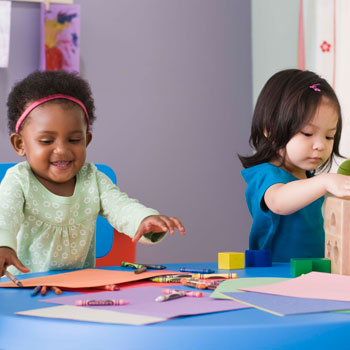A Parent’s Guide to Early Childhood Education

More and more children under the age of six are now in school. The sweeping social, economic, and technological changes of the last decade have made school an increasingly important part of our children’s lives at ever-younger ages. We no longer see early childhood schools as the luxury our parents once did. For many parents it has become a necessity. As our society has become ever-more complex and our lives more fragmented, our needs and expectations for school have grown accordingly. We expect our schools to give our children the kind of education that will enable them to get into the top colleges and universities. We also expect our schools to take on new roles that have traditionally belonged to us as mothers and fathers but that we many no longer have either the time or the energy to handle it. We rely on schools to teach our children not only all the things schools have traditionally taught children but also to teach them everything from good table manners to sound moral values. As a result of these changes many schools are seriously considering taking on early childhood education.
Early childhood education is the type of education given to children in their earlier years so that they may acquire skills that they will need so survive and ultimately to thrive in our world. It is showing our children in our day-to-day lives that we love and respect them and also helping them learn and respect themselves. Early childhood education teaches our children to be a part of our society, to value learning, to have high standards, to get along with others, to be responsible, to share, to be a good sport, to make friends, to work and to play alone with others. Early childhood education is the way we, and our parents and grandparents before us, have started our children off on the road to self-knowledge, self discipline, self-esteem, competency, and independence.
Good early childhood programs or schools are based on the development of the whole child. They provide a safe, nurturing environment that fosters emotional, social, and cognitive development of children. Good schools and programs recognize that play is fundamental to the intellectual development of young children. Early childhood education enables young children to develop a positive attitude.
Countless teachers have stated that they have found that when children in the classrooms lack a positive sense of self or when they can’t get along with others, they are seldom able to learn at an optimal level regardless of how many sight words they can identify or facts that they can memorize. If children are always worrying about whether or not they are really okay or about what their peers think of them, their ability to learn will be affected no matter how intelligent they are. Good early childhood schools and programs help children develop self-esteem by giving children opportunities to learn about themselves and their world. They provide experiences that will challenge but not frustrate or overwhelm the child-experiences that will help the child develop a sense of competency that will let the child feel successful.
Good early childhood schools and programs help children learn to play together and share their toys. It is here that children begin to learn that different behaviors can be appropriate at different times and places. Children develop a willingness to listen and to pay attention, to focus in on a task and to complete it, to develop expectations and to set and achieve goals. Children learn many things in good early childhood schools and programs, but the most important they learn is how to get along with others and hot to function effectively in a group. There are many good early childhood schools, but no one early childhood school is right for every child. Unless you happen to live in a fairly large city, you probably will not have the option of choosing from the many types of early childhood schools. There may well be only one or two schools in your neighborhood. When you do not have a lot of choice, the quality of the school is more important than it expressed philosophy. If there are not schools near you that seem to meet the criteria for good early childhood schools, you may want to consider keeping your child at home or looking into some of the alternatives to early childhood schools. MyBabyBoutique.Net offers unique Educational Toys, Baby Toys and Wooden Toys for children ages 0-10 years old.
Article Source: http://www.parentingarticlelibrary.com
